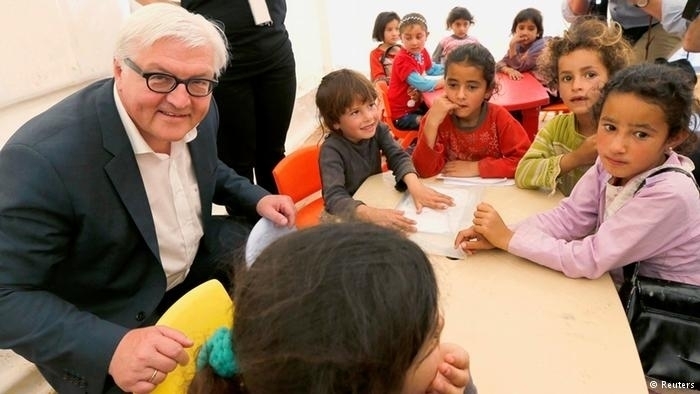Ahmed left his family in Turkey and travelled to Belgium by sea. His children learned the names of the European countries he passed through from the voice messages he sent to them along the way. It was a difficult journey, and his family waited many days before their dream of Ahmed reaching Europe finally came true.
"The treatment by the Belgian police was worth it", Ahmed told his wife.
Hind is a Syrian refugee in Germany. She says that the asylum experience varies from person to person. For families, it was salvation from death that led them to escape their homes and their homeland. For them, asylum is the end of the tragedy of homelessness in the refugee camps and the inhuman conditions they faced, it is the start of a normal life for their children who have been deprived of education and basic rights.
"Asylum is a stable life, where children can be raised in a healthy environment that satisfies the needs which Syrians have lost in their own country, and therefore, it is a satisfactory feeling for parents who believe they have saved their children and their rights", Hind said.
"As for young men, asylum is a chance to continue their education, escape from death or arrest, and salvation from harsh financial and psychological problems. Asylum for families eases the suffering from the new atmosphere, the different society and culture, and it reduces the impact of psychological alienation", Hind added.
But Nisreen, a Syrian refugee in Sweden, has spent more than six months waiting for her residency to be approved in order to apply for a request reunite with her children. Nisreen asks herself every day why she is here, and whether seeking asylum was the right decision, especially in light of the difficulties in communication because of the language barrier, which will not be broken until she gets a residency and begins language courses.
Khalid believes that language is the most significant barrier preventing integration with the community. In addition, Syrians are not familiar with the government departments and the required paperwork in the countries they seek asylum. Furthermore, securing a house is a major hurdle in many asylum countries, as some Europeans refuse to rent their homes to refugees, and the deposit required is often too expensive to secure.
These difficulties increase stress on asylum seekers as refugees are obliged to secure adequate housing within a specific time frame, with governments refusing to accept reunion requests if proper housing is not secured.
Refugees who arrived in asylum countries through the UNHCR do not suffer from these problems. Housing is provided, refugees are immediately enrolled in language courses, and an interpreter accompanies them until their official paperwork is complete.
Yet, many also face the same issues of integration and lifestyle differences upon arriving. In Europe, much of the day starts at 7 a.m and ends at 7 p.m., unlike in Syria where cities are active for 24 hours a day.
"Many shops in Syria are open all the time, and the social life is different here; there are no friends and neighbors, everyone is busy with his work, especially if we consider the long working hours and the vast distances between places. Our cities were small, and our alleys were narrow", Nisreen said.
Ahmed says that one of the factors preventing integration with new communities is Syrians’ financial difficulties, which prevent them from leaving their residences, moving around and communicating with others. The salary paid to the refugees is scarcely enough to pay the rent of the house and buy food.
Children, on the other hand, may find less difficulty adapting to their new lives abroad, as they learn new languages faster, and are less connected with their Syrian culture, facilitating a smoother integration with the new community.
But this is not the case of the 9-year-old Mutaz, who often asks his parents to return to Homs. "His extended family still lives in Homs despite the distance, the constant online communication with friends and family there keeps us away from the society around us, and constitutes a significant barrier, especially with the sense of guilt because we live in a safe place while our relatives may die at any moment", Mutaz's father said.
Hind believes that seeking asylum was the worst decision she has made in her life, escaping Syria for fear of prosecution and detention after being dismissed from work, and moving between several countries, one of which was Lebanon, where the security, financial and psychological situation is tragic.
Hind justifies her feeling that unlike other families who wanted to secure the future of their children, or young men at the beginning of their life, she has reached an age where it is difficult to start a new life.
But the suffering of Syrians in Europe is only a small fraction of the sufferings of Syrians elsewhere, especially if we consider the total number of Syrians who arrived in Europe is no more than 300,000 refugees, constituting less than 2 percent of the total number of Syrians inside Syria and abroad.
Translated and edited by The Syrian Observer


